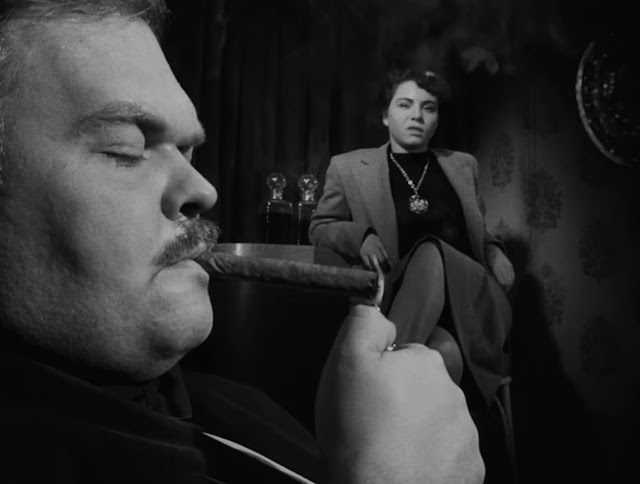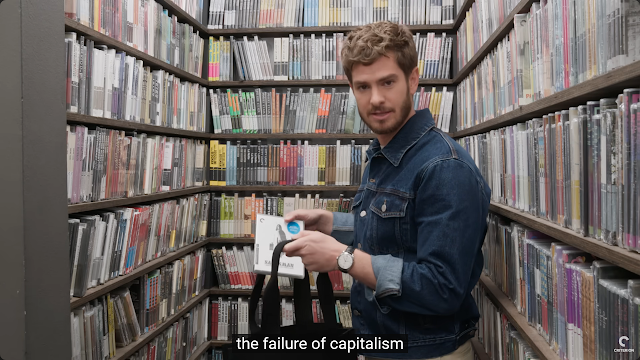Dementia (John Parker, 1953/1955)
Your host serendipitously discovered the wonders of John Parker's experimental thriller Dementia (1953/1955) accidentally confusing it with Francis Ford Coppola's Dementia 13 (1963). An unforgivable error to Coppola's stans, but a rewarding fluke for anyone with an appreciation for vintage psychotronic film, regardless. A bizarre, psychological thriller — free of any dialogue — peppered with horror elements, and shot like a stylish film noir. Visually, many parts of it reminded me of Orson Welles' Touch of Evil (1958).
After waking from a nightmare, The Gamin (Adrienne Barrett), a mentally disturbed woman and the film's heroine, wanders around skid row experiencing various surreal encounters with distinguishable nighthawks: The Evil One (Richard Barron), a sleazy pimp introduced multiple times; The Rich Man (Bruno VeSota), the Orson Welles looking sugar daddy; and The Law Enforcer (Ben Roseman), a cop on her trail, who later reappears as her father. These run-ins serve as vignettes showing off the obvious Luis Buñuel's levels of surrealism inherent in the film. A fascinating anomaly in cinema, as despite being such an outlier, its influence is profoundly evident in more celebrated films with a deeply psychological bent. Herk Harvey's Carnival of Souls (1962) and Roman Polanski's Repulsion (1965) share obvious DNA with this lesser seen horror noir.


Despite the absence of any dialogue, Dementia manages to incorporate sound and music in a creatively playful fashion. An eerie score, which would have perfectly complimented the popular science fiction flicks of its era, features a wailing female vocal courtesy of Marnie Nixon that is otherworldly. The result lends to the film's hauntingly, dreamlike atmosphere and surreal visuals. Another
highlight in sound is how Shorty Rangers and his Giants' music
uniquely syncs into the film. You hear the band's music playing off-screen, and then witness them playing it when The Gamin stumbles upon them in a jazzy night club. Like something the Zucker Brothers might have written for one of their spoof comedies.
The basic gist of the film was the brainchild of Parker's secretary, Adrienne
Barrett, relaying an actual dream she had to the director. Not only did it spawn the film, it also managed to get Barrett, an untrained actress, into being cast in the lead role. Incidentally, despite Parker's name being credited as the film's director, according to numerous
sources VeSota, alleges to have also co-directed the film (uncredited, however).
Dementia was intended to be a short film, but additional scenes kept on being filmed during its production, with the finished version clocking in at just under an hour. Still a short film, regardless.


Symbolism plays heavily in Dementia. A traumatic event from our protagonist's past unfolds via a surreal graveyard scene (easily one of the major highlights from the film). In it, we our heroine's parents; her father feeling frisky, but the mother being unreceptive to his advances. The discarded cigar in an ashtray nearby, representing an adulterous incident and the subsequent ramifications of it, is hugely important to The Gamin's backstory. In a later scene, The Rich Man's stogie becomes a triggering catalyst to events in the present. This is all somewhat of a revelation for a film from the fifties. Granted, dark themes in films from this era were hardly new, just look at Charles Laughton's The Night of the Hunter (1955) for example, but they also had the advantage of smart and nuanced dialogue to get away with various details which might have been deemed inappropriate for its time.
Another fascinating element is William C. Thompson being the cinematographer for the film. The same individual who photographed numerous Edward D. Wood Jr. films also did this. You wouldn't know it, however, as the film looks astonishingly more artistically stylish compared to the B-movie fare he would make before and after (and professional, for that matter). Hence, the visual comparison to Welles' striking aforementioned noir. Amusingly, Dementia was the film Thompson worked on before The Violent Years (1956) — a personal favourite in the canon of juvenile delinquency films.


Although completed in 1953, Dementia languished in limbo for a couple of years, until Parker managed to secure an incredibly limited theatrical release. It would prove to be the one and only film he would make. However, it was later re-released with the alternative title Daughter of Horror (1957); with American TV celebrity, Ed McMahon narrating over it and addressing the lack of dialogue in the original. It's this version of the film where footage of it is playing during the cinema scene from Irvin Yeaworth and Russell Doughton's famous monster flick The Blob (1958); starring the legendary actor, Steve McQueen.
A curious oddity from the 1950s. Dementia's production history is just as strangely fascinating as the contents of the film. A weird anomaly which ought to be recognised by both film historians and genre heads as genuinely being ahead of its time. Although not quite on the same tier as the movies that it inspired, Dementia is unquestionably a remarkable effort given the talents involved, along with it being such a mind blowing discovery. It's an anachronistic film which should appeal to armchair shrinks and anyone interested in surrealist films or vintage B-movies.








%20-%20Original%20Trailer%20(4K)%20-%20YouTube.png)



%20Official%20Trailer%20-%20Adam%20Driver%20Giancarlo%20Esposito%20Nathalie%20Emmanuel%20-%20YouTube.png)
%20Megalopolis%20(2024)%20Official%20Trailer%20-%20Adam%20Driver%20Giancarlo%20Esposito%20Nathalie%20Emmanuel%20-%20YouTube.png)










